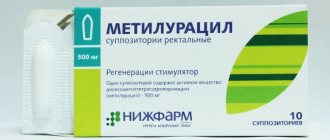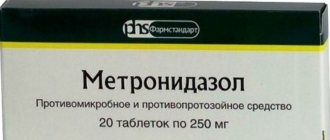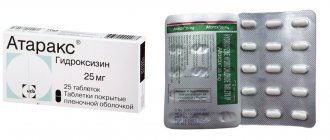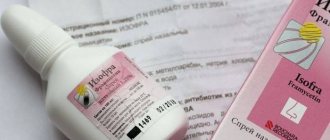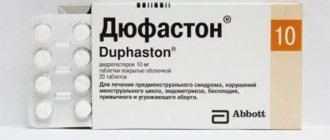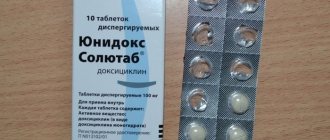Category: Published 01/06/2017 · Comments: · Reading time: 4 min · Views: 4,268
Curantil tablets help prevent the formation of blood clots and restore the body’s defenses. What does this medicine help with? The drug improves blood circulation. The instructions for use suggest using “Curantil” tablets for the prevention and treatment of thrombosis and heart diseases.
Pharmacological properties
Curantil tablets, which help the medicine prevent the formation of blood clots, have antiplatelet, vasodilating and immunomodulatory effects. The drug dilates blood vessels, increases the speed of blood circulation and its quantity, and improves oxygen supply to the heart muscle.
The drug is actively used for the treatment of many cardiovascular pathologies due to the ability of the active substance to prevent thrombus formation. The use of Curantil tablets during pregnancy helps prevent blockage of the placental vessels.
As a result, the likelihood of complications associated with manifestations of hypoxia and insufficient oxygen for the child is significantly reduced. The immunomodulatory properties of the drug are due to the formation and increase in interferon activity.
This allows the medicine to be used for the prevention and treatment of influenza and colds. After taking the tablet, the maximum effect is observed after 1 hour.
Why is Curantil recommended during pregnancy?
In obstetric practice, the prescription of Curantil tablets is a standard scheme for the prevention of intrauterine pathologies in the fetus. The main nutrition to the baby comes through the placenta and umbilical cord, which are penetrated by a network of small blood capillaries.
The smaller the lumen in the bloodstream, the worse the transport of oxygen, nutrients and minerals to the embryo. This is fraught with hypoxia and inhibition of the development of organs, systems, and weight gain.
In most cases, pregnancy proceeds normally, but if a woman has a genetic predisposition to thrombophlebitis, the likelihood of full development of the fetus is at risk.
If the expectant mother does not know about the problem, then the pregnancy may be unsuccessful. Due to the formation of blood clots in the bloodstream of the umbilical cord or in the placenta, fetal development is impossible. At 10–14 weeks, a frozen pregnancy or miscarriage can be diagnosed.
To prevent such cases, a woman is prescribed Curantil throughout pregnancy according to a regimen individually selected by the gynecologist and with constant monitoring of the well-being of the woman and the fetus.
Additionally, an analysis is carried out to determine the qualitative characteristics of blood viscosity and the possibility of blood clots.
Contraindications
Doctors and the instructions forbid taking the Curantil tablet if:
- liver failure;
- low blood pressure;
- atherosclerosis of the coronary arteries;
- hypersensitivity to the drug "Curantil", from which these tablets can cause allergies;
- obstructive pulmonary pathologies occurring in severe form;
- heart failure;
- angina pectoris;
- kidney failure;
- collapse;
- complicated hypertension;
- aortic stenosis;
- ailments that cause bleeding;
- hemorrhagic diathesis;
- myocardial infarction;
- severe arrhythmia.
Overdose symptoms, treatment
The cardiovascular and nervous systems respond most quickly to exceeding the permissible dose of Curantil.
On the part of the heart and blood vessels, there is a decrease in total blood pressure, tachycardia (increased heartbeat), redness of the skin and a feeling of heat in the body. The central nervous system and its peripheral parts react with the development of general weakness and dizziness. Currently, no antidote has been identified. To quickly eliminate the most severe symptoms, it is recommended to stop taking the medication. Next, intravenous administration of the drug “Aminophylline” is prescribed in a volume of up to 100 mg. If an attack of angina pectoris (or any other heart reaction) develops, Nitroglycerin is prescribed - 1 tablet under the tongue.
In addition, symptomatic treatment is carried out in accordance with the severity of the patient's condition. Hemodialysis in case of an overdose of the drug "Curantil" (medical reviews confirm) will not give a positive effect.
Medicine "Curantil": instructions for use
Taking tablets "Curantil 25"
During influenza epidemics, as well as to prevent respiratory viral infections, you need to drink 50 mg of the drug once a week (2 tablets). Take the medicine for a month.
To prevent recurrent incidence of ARVI, especially for persons with a predisposition to these ailments, 100 mg of the drug per day is prescribed. Drink 2 tablets with an interval of 2 hours. The duration of therapy takes 2-2.5 months.
Instructions for use of tablets "Curantil 75"
The dosage is determined by a specialist depending on the complexity of the pathology and the individual characteristics of the patient. To reduce platelet aggregation, Curantil 75 is taken in the amount of 1-3 tablets per day. In difficult cases, the dosage can reach 0.6 g.
To treat coronary heart disease, you need to take 1 tablet of 75 mg every 8 hours. It is possible to increase the volume of the drug taken. To prevent thrombosis and in case of impaired cerebral circulation, 3 to 6 tablets per day are prescribed. The maximum daily dose is 0.45 g.
Use during pregnancy
An individual approach to the selection of a treatment regimen is required. The standard dose can be 25 mg three times a day.
Before or after meals?
How to take Curantil is explained in the instructions for use. The medicine is taken before meals with half a glass of water. Do not chew the tablets.
By
Release form and composition
There are such forms of release of this drug as tablets, dragees and intravenous solution.
| Release form | Description |
| Pills | They have a yellow, sometimes with shades of green, color. The dosage can be 25, 50, 75 or 100 mg - this is indicated immediately on the package, for example, Curantil 75. |
| Dragee | They may contain 25 or 75 mg of the active ingredient and are placed in dark glass bottles. |
| Solution | Placed in transparent glass ampoules, the concentration is 0.5%. Each container contains 2 ml with 0.01 g of active substance. |
The composition of the drug of any form includes the active element dipyridamole.
Additional substances in tablets:
- Macrogol 6000 - a polymer of ethylene glycol, is a substance for cleansing the intestines. It is not absorbed into the bloodstream at all and is released in its original quantity.
- Lactose monohydrate acts as a sugar substitute in medicines.
- Povidone k-25 is used to prepare medicinal solutions.
- Corn starch does not have a medicinal effect; it is only needed as a filler for tablets.
- Titanium dioxide is used in the preparation of tablets and capsules. Gives a white color and is a filler.
- Hypromellose is a universal additional substance for the preparation of solid forms of drugs, used for granulation.
- Magnesium stearate is an emulsifier, often synthetic, used as an auxiliary element.
Curantil and, in particular, dipyridamole, improves the movement of blood through the vessels. This occurs due to the fact that the active substance of the drug prevents platelets from sticking together. In addition, it expands arterioles - the smallest arteries, even smaller than capillaries. The uniqueness of the component is that this effect does not affect large arteries and vessels. Dipyridamole also increases the body's resistance to a harmful external environment, that is, it promotes the functioning of the immune system. When dipyridamole enters the body, it triggers the synthesis of interferon, making it more resistant to viral infections.
The highest concentration of the main substance in plasma is achieved an hour after oral administration. Communication with plasma proteins is almost complete. Dipyridamole tends to accumulate in red blood cells - erythrocytes and in the heart. The substance dipyrimidol tends to be deposited in gallstones. Metabolization of the active component occurs in the liver due to communication with glucuronic acid. The half-life is 20-30 minutes, exit from the body is with bile.
Side effects
The drug "Krantil" can cause:
- tides;
- headache;
- arthritis;
- hyperemia;
- noise in ears;
- tachycardia;
- thrombocytopenia;
- weakness;
- diarrhea;
- heartbeat;
- bradycardia;
- myalgia;
- skin rash;
- nausea;
- ear congestion;
- decreased blood pressure;
- hives;
- vomiting;
- bleeding;
- dizziness;
- rhinitis;
- epigastric pain;
- excessive bleeding during surgery.
special instructions
In case of an overdose of "Curantyl 75", blood pressure sharply decreases, tachycardia occurs, and severe weakness appears. It is necessary to rinse the stomach, induce artificial vomiting and drink absorbents (hydrolytic lignin, activated carbon).
To avoid disruption of the normal functioning of the stomach, the drug is washed down with milk.
To normalize intracardiac blood flow in the event of circulatory disturbances in the myocardium, Amminophylline is prescribed.
When driving vehicles, you should be careful. If there is a sharp decrease in pressure, it is better not to drive
Analogs of the drug "Curantil"
Drugs that have a similar effect:
- "Clopidogrel."
- "Tromboneti".
- "Aspirin Cardio"
- "Dysgren."
- "Plavix".
- "Cardiomagnyl".
- "Aspecard."
- “Godasal.”
- "Plagril."
- "Aspicor".
- "Zilt."
- "Brillinta."
- "Atrogrel".
- "Magnicor".
- "Atherocardium".
Drug interactions
When using the drug, it is necessary to take into account interactions with other medications:
- With simultaneous use, Curantil enhances the effect of antihypertensive drugs.
- When used together, Curantil may weaken the anticholinergic effects of cholinesterase inhibitors.
- When used simultaneously, xanthine derivatives weaken the vasodilator effect of Curantil.
- With simultaneous use of Curantil with anticoagulants or acetylsalicylic acid, the antithrombotic effect of the latter increases and, accordingly, the risk of developing hemorrhagic complications.
Consumer opinion about a pharmaceutical product
Consumer reviews about the effectiveness of Curantil tablets are mostly positive, although there are comments from patients who did not notice a difference from their prescription. There are many discussions on forums for young mothers about the advisability of prescribing pills during pregnancy:
Tatyana, 27 years old “I took Curantil during pregnancy as prescribed by my gynecologist. I thought that I had some problems, but in the corridor I heard from other girls that it was prescribed to everyone, without exception, at the initial stage of fetal development. The doctor explained that this is necessary for adequate nutrition of the fetus, so that the lumen of the blood artery in the umbilical cord and in the capillaries of the placenta is normal and blood circulation is not inhibited. I didn't argue. It’s necessary, that means it’s necessary! The baby was born without pathologies and with good immunity, because she herself was not sick. Later I learned that it is recommended as a prophylaxis against influenza and viruses, and not only for pregnant women.”
Anzhelika, 26 years old “To give birth to my first child, I had to go through a lot. Several attempts failed, although I considered myself completely healthy and all the tests confirmed this. After my third miscarriage, I was referred to a geneticist, who ordered a test to determine my susceptibility to blood clots. It turns out that during pregnancy the likelihood of blockage of a blood vein in the umbilical cord increases several times. The diagnosis was confirmed. I was prescribed a complex treatment, which included Curantil. I drank it constantly during pregnancy, but under the close supervision of my gynecologist and therapist. Everything was successful and I finally became a mother. Everything is fine with the child. Girls, do not refuse the treatment proposed by the doctor, and do not look for pitfalls in this if you want health for yourself.”
What does Curantil 25 help with: indications
- Treatment and prevention of ischemic cerebrovascular accidents
- encephalopathy
- primary and secondary prevention of coronary heart disease, especially with intolerance to acetylsalicylic acid
- prevention of arterial and venous thrombosis and treatment of their complications
- prevention of thromboembolism after heart valve replacement surgery
- prevention of placental insufficiency during complicated pregnancy
- microcirculation disorders of any type (as part of complex therapy)
- prevention and treatment of influenza, ARVI (as an interferon inducer and immunomodulator) - for taking the drug in a dose of 25 mg.
Patients' opinions about "Curantil"
The opinions of people who took Curantil both in connection with various diseases and during pregnancy are both positive (the majority of such reviews) and negative.
Patients who took the drug for cerebrovascular accidents speak well of the medication. And the headaches practically go away, and the dizziness and feelings of constant general weakness cease to bother me. The majority of reviews from pregnant women about Curantil are also positive. A woman’s body, which works under heavy overload, must provide the developing child with oxygen and nutrients in full. And if there are problems with the vessels of the brain, heart, or blood microcirculation, this medication will come in very handy.
However, negative opinions about the medication also exist. This is not to say that side effects develop very often, but they do exist. For example, reviews from pregnant women about taking the drug “Curantil” report problems such as headaches and decreased blood pressure. The development of allergic reactions in the form of skin rashes and itching is not so uncommon.
In general, everything is strictly individual. For some, “Curantil” helped get rid of problems, for others it caused undesirable effects. In any case, consulting a doctor and strictly following his instructions will minimize the development of side effects and help achieve a positive effect when treating with this drug.
The antenatal clinic gave me Curantil for free. Drink 3 times a day for two weeks, then take a break for two weeks and drink again. What is it for and who drank it. The contraindications are scary; it says that it should be taken with caution during pregnancy, I don’t have any complications, everything is normal.
Woman.ru experts
Find out the opinion of an expert on your topic
Anastasia Sergeevna Shikhaleeva
Psychologist. Specialist from the site b17.ru
Mishurov Sergey Valentinovich
Psychologist, Consultant Sexologist. Specialist from the site b17.ru
Spiridonova Nadezhda Viktorovna
Psychologist. Specialist from the site b17.ru
Victoria Kiseleva
Psychologist, Gestalt therapist. Specialist from the site b17.ru
Muzik Yana Valerievna
Psychologist, Psychoanalyst. Specialist from the site b17.ru
Semikolennykh Nadezhda Vladimirovna
Psychologist. Specialist from the site b17.ru
Yulia Vadimovna Voronina
Psychologist, bibliotherapist. Specialist from the site b17.ru
Wrzecinska Eva
Psychologist. Specialist from the site b17.ru
Zadoina Lyudmila Alexandrovna
Psychologist. Specialist from the site b17.ru
Reviews
Valentin, gynecologist
It is difficult to live without some medications during pregnancy. One such remedy is Curantil. It helps cope with edema, improves the functioning of the cardiovascular system and can be used as a prophylactic against placental insufficiency.
Alevtina, obstetrician-gynecologist
You can take any pills and medications during pregnancy only after they have been prescribed by a doctor. Taking Curantil in the 1st, 2nd and 3rd trimesters helps improve the functioning of the entire body of the expectant mother. But at the same time, if side effects occur, you should immediately stop taking the drug.
Victoria, 23 years old
I took Curantil in the 2nd trimester, as slight swelling appeared. I noticed the first improvements on the 7th day of taking the medicine, the swelling began to gradually subside, and my health began to improve.
Inga, 29 years old
I took Curantil in the 3rd trimester. Afterwards I had a severe headache and started bleeding. I had to stay in the hospital for 2 weeks for conservation.
Despite the undoubted benefits of using Curantil, in certain cases it can cause harm. Do not self-medicate and strictly follow the specialist’s recommendations and then pregnancy will be easy!
Precautionary measures
The instructions provide an impressive list of contraindications for use. Therefore, under no circumstances should you drink it on your own if swelling or other symptoms appear, which are usually indications for use. Main contraindications:
- hypersensitivity to the components of the drug;
- heart disease associated with damage to the coronary arteries;
- severe hypertension or hypotension;
- peptic ulcer of the gastrointestinal tract during an exacerbation;
- decreased blood clotting;
- insufficiency of kidney and liver functions.
In the presence of these diseases, Curantil is not used; other drugs are used to treat placental insufficiency. Taking Curantil may cause side effects. The risk of their development increases if the medicine is taken in high doses. During treatment, the following may occur:
- increase in heart rate – tachycardia;
- digestive disorders;
- bleeding gums;
- migraine;
- skin allergic reactions.
Taking Curantil should be stopped several weeks before giving birth. This drug thins the blood, reducing its ability to clot. Therefore, taking it increases the risk of massive bleeding during childbirth.
Therefore, the course of treatment is usually completed at 35-36 weeks and the drug is not taken until delivery. With long-term use of Curantil, it is necessary to periodically monitor the platelet count in the blood. If their concentration drops, treatment is canceled.
So, Curantil during pregnancy can be prescribed to prevent the development of serious complications caused by high blood clotting rates. Thanks to this drug, you can avoid the development of placental insufficiency, gestosis, and varicose veins. In the early stages, Curantil can be prescribed as a prophylactic agent to prevent infection with ARVI.
Why is Curantil prescribed to pregnant women?
Curantil belongs to the group of antiplatelet agents. These medications prevent platelets from sticking together and increase their lifespan.
Prevention of placental insufficiency is the main reason for prescribing Curantil to pregnant women. With this disease, the placenta (a special organ connecting the fetus with the mother’s body) ceases to perform its functions: it does not supply the embryo with oxygen and does not nourish it.
The drug improves blood circulation and eliminates the lack of oxygen (hypoxia) in fetal tissues. It also prevents intrauterine growth retardation and negative changes in the placenta (for example, its detachment).
Curantil is safe for the baby, since it only affects the blood vessels of the placenta, which serves as a barrier that prevents drugs and infections from reaching the developing embryo.
This remedy also benefits the pregnant woman herself. It thins the blood, preventing the formation of blood clots. Improves blood microcirculation, preventing varicose veins and hemorrhoids. Helps lower blood pressure, improve kidney function and strengthen blood vessels.
In addition, the active substance (dipyridamole) stimulates the formation of interferons that fight viruses. Therefore, the medicine strengthens the immune system, reducing the risk of contracting influenza and ARVI.
The drug is used to prevent high blood pressure, seizures, late toxicosis and edema.
In women with hypotension, an even greater decrease in blood pressure is possible.
If there is an urgent need to take this drug, then the discomfort caused by the drug should be compared with the benefits for the baby. This will help you decide whether it is advisable to take Curantil in your case or whether you should look for an alternative.
Every woman should ask her gynecologist why she is taking Curantil. There are several reasons:
- prevention or treatment of blood circulation disorders in the placenta;
- fetal hypoxia;
- an increase in the number of platelets diagnosed by a blood test;
- protection against seasonal diseases (ARVI, acute respiratory infections, influenza);
- increased blood clotting;
- insufficient blood circulation in the capillaries;
- arterial hypertension (high blood pressure);
- prevention of thrombosis in varicose veins.
To justify the use of this drug, there must be information proving the development of one of the diseases in the future. There is no point in drinking Curantil for a healthy woman with a normal pregnancy.
Alcohol compatibility
No formal studies have been conducted on the interaction of alcohols and dipyridamole. However, knowing the biochemical properties of these substances on the human body, it is easy to predict the consequences.
Alcoholic drinks impair the distribution and effectiveness of the drug, so the patient simply will not receive the expected therapeutic effect, throwing money down the drain. In addition, it is bad habits that are most often the factors that aggravate or even contribute to the underlying disease. Therefore, you should abstain from drinking alcohol for the entire period of treatment and recovery.
Indications for use
Curantil is prescribed in cases of microcirculation disorders (ischemic brain type, any other), provided that it is used in complex combination with other medications prescribed in a particular case. The main use of the drug is in preventive measures to prevent the development of:
- thrombosis in large vessels;
- probable risk of thromboembolism;
- viral lesions, as a means of immunomodulating interferon inductance;
- fetoplacental insufficiency, gestosis or fetal hypotrophy (during pregnancy, during pregnancy complications);
- thrombosis of blood vessels and hypercoagulation in varicose veins of any dislocation.
Its use allows not only to provide the necessary effect in dyscirculatory encephalopathy, but also to prevent the development of primary and secondary cardiac ischemia, help with difficult pregnancy or develop resistance to viruses.
In the early stages
The use of the drug in the first trimester helps to normalize the blood supply to the placenta (baby place). If blood circulation is impaired, the fetus will receive insufficient oxygen and nutrients necessary for its growth and development. This is especially important if a woman has a blood coagulation disorder. IMPORTANT! The drug is taken under the strict supervision of a doctor to prevent excessive effect of the drug.
Curantil can be prescribed as an immunomodulatory drug for viral infections. It should be remembered that the therapeutic effect of the drug exceeds the adverse consequences of the infection on the fetus.
The appointment of this drug in the early stages is carried out with the aim of further normal pregnancy. If undesirable effects occur, you should consult a doctor who will replace Curantil with its analogue.
What it is?
Curantil is a drug aimed at improving blood circulation and preventing the formation of blood clots, as well as dilating blood vessels. These functions of Curantil, in fact, are the properties of the fundamental substance - dipyridamole.
The drug Curantil
Properties of dipyridamole:
- vasodilating is a property of the drug that allows you to increase the lumen in the blood vessels. Due to the increase in lumen, smooth muscles are restored, but not in the literal sense. Those. recovery should not be understood as muscle renewal, but in this case recovery is a kind of relaxation. In medicine, drugs with this property are successfully used to treat hypertension.
- antiaggregation is a property of the drug that prevents the formation of blood clots. More precisely, we can say what prevents cells from sticking together, i.e. the impact on the thrombus occurs at the stage of its inception. In practice, drugs of this effect support the condition of a patient after an ischemic stroke, with vascular diseases of the legs, etc.
- angioprotective is a property of the drug that causes vasodilation, improves blood circulation at micro levels (i.e. in cells), eliminates spasm in smooth muscles, normalizes the level of blood viscosity, strengthens capillary walls, and also accelerates metabolic processes in blood vessels (i.e. .metabolism). In a word, the effect of a drug with this property can be expressed in the complete normalization of the functioning of body cells, including blood cells. These medications today treat atherosclerosis, diabetes of various degrees, vein diseases, etc.
- immunomodulating is a property of a drug that allows it to influence the body’s immune system. Stimulation of processes occurs in order to improve the condition of cells by producing substances necessary for the body. A medicine with this ability helps fight microbes, formations, inflammation and other processes that interfere with the normal functioning of the body. Immunomodulating drugs are used to treat viral and inflammatory diseases, and are also widely used to combat allergies, weaken the immune system, etc.
"Ginkgo biloba"
Another analogue for “Curantil” is “Ginkgo Biloba”. This is an over-the-counter herbal product. It is made from a plant with anti-aggregation properties. This component, as a rule, is part of many combined food supplements, and, in addition, is used as an independent drug. It is quite popular in the domestic pharmaceutical market, but is not approved as a medicine in the USA. The disadvantage of products based on this plant is the very large price range, which varies from one hundred twenty rubles to one and a half thousand, depending on the manufacturers, as well as the number of tablets in one package. The drug has no side effects, except for a possible allergic reaction to the plant itself.
Description
Curantil is a drug created to improve blood microcirculation. Problems with blood circulation can cause difficulties with conception and pregnancy.
The drug improves blood movement in small vessels and capillaries. The main ingredient is dipyridamole, which is an immunomodulator and antiplatelet agent. Available in the form of dragees and tablets containing the active ingredient 25 and 75 mg.
How to determine the dosage of the drug? Very simple! The content of the active substance is indicated in the name. So, Curantil 25 is a drug containing 25 mg of dipyridamole. Curantil 25 is packaged in glass bottles of 100 and 120 tablets.
Curantil 75, respectively, contains 75 mg of dipyridamole. Curantil 75 is packaged in blisters of 40 pieces in one package.
Antiplatelet effect
The drug is an antiplatelet agent, that is, a substance that prevents cell adhesion and the formation of blood clots. Blood clots can block the lumen of the vessel, thereby impairing blood circulation.
The tendency to form blood clots is very dangerous for both the woman herself and the unborn child. If the placental vessels become clogged, the fetus will suffer from hypoxia and may even die.
If the tests reveal a high risk of thrombus formation, the woman will be prescribed antiplatelet drugs. It is likely that it will be Curantil, since the drug has proven itself well and is safe for pregnant women. The drug has the following effects:
- prevents the formation of cholesterol plaques;
- tones the walls of blood vessels;
- promotes blood thinning;
- stimulates blood circulation.
It happens that problems with blood circulation are a problem of temporary infertility. When planning pregnancy, chimes are prescribed to activate blood circulation in the pelvic organs.
Immunomodulatory effect
The term immunomodulator is usually used to denote agents that restore the functioning of the immune system. Curantil stimulates the production of interferon, that is, it increases the body's resistance to infections.
special instructions
The attached instructions contain the following special instructions that must be read before starting treatment:
Do not take the tablets with tea or coffee, as they can reduce the vasodilatory effect of the medication; For patients under 12 years of age, Curantil is prescribed only for complicated diseases of the hematopoietic system; During treatment, you must drive with caution, since the drug affects concentration; Combining the drug with alcoholic beverages increases the risk of side effects.
Curantil tablets are prescribed to patients with liver and kidney failure only under constant medical supervision.
Advantages and disadvantages
| Consumption of Curantil provides the necessary assistance to avoid complications during pregnancy, such as: | Key disadvantages of the drug |
| Convulsions | The safety of the drug has not been fully confirmed by clinical and laboratory experiments. |
| High blood pressure | A large list of side effects and restrictions. |
| Cephalic syndrome | Individual sensitivity to the constituent part of the drug. |
| Edema | It is advisable to complete the course of using Curantil a month before the estimated date of delivery. Dipyridamole thins the blood, and bleeding may occur during labor. |
| “Failure” of the vital functions of the urinary system after childbirth |

